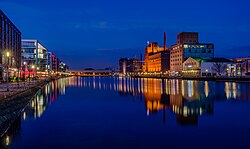Duisburg
Duisborg (Low German) | |
|---|---|
 | |
| Coordinates: 51°26′05″N 6°45′45″E / 51.43472°N 6.76250°E | |
| Country | Germany |
| State | North Rhine-Westphalia |
| Admin. region | Düsseldorf |
| District | Urban district |
| Subdivisions | 7 boroughs, 46 suburbs |
| Government | |
| • Lord mayor (2017–25) | Sören Link[1] (SPD) |
| • Governing parties | SPD / CDU[2] |
| Area | |
• City | 232.82 km2 (89.89 sq mi) |
| Elevation | 31 m (102 ft) |
| Population (2023-12-31)[3] | |
• City | 503,707 |
| • Density | 2,200/km2 (5,600/sq mi) |
| • Metro | 8,711,712 (Rhineland) |
| Time zone | UTC+01:00 (CET) |
| • Summer (DST) | UTC+02:00 (CEST) |
| Postal codes | 47001–47279 |
| Dialling codes | 0203 |
| Vehicle registration | DU |
| Website | www.duisburg.de |
Duisburg (German: [ˈdyːsbʊʁk] ; Low German: Duisborg, pronounced [ˈdʏsbɔɐ̯χ]) is a city in the Ruhr metropolitan area of the western German state of North Rhine-Westphalia. Lying on the confluence of the Rhine (Lower Rhine) and the Ruhr rivers in the center of the Rhine-Ruhr Region, Duisburg is the 5th largest city in North Rhine-Westphalia and the 15th-largest city in Germany.
In the Middle Ages, it was a city-state and a member of the Hanseatic League, and later became a major centre of the iron, steel, and chemicals industries. For this reason, it was heavily bombed in World War II. Today it boasts the world's largest inland port, with 21 docks and 40 kilometres of wharf.
- ^ Oberbürgermeisterwahl Stadt Duisburg 24.09.2017, accessed 4 October 2022.
- ^ "Groko im Duisburger Rat: Weiter so statt Neuanfang". 11 November 2021.
- ^ "Bevölkerung der Gemeinden Nordrhein-Westfalens am 31. Dezember 2023 – Fortschreibung des Bevölkerungsstandes auf Basis des Zensus vom 9. Mai 2011" (in German). Landesbetrieb Information und Technik NRW. Retrieved 2024-06-20.




